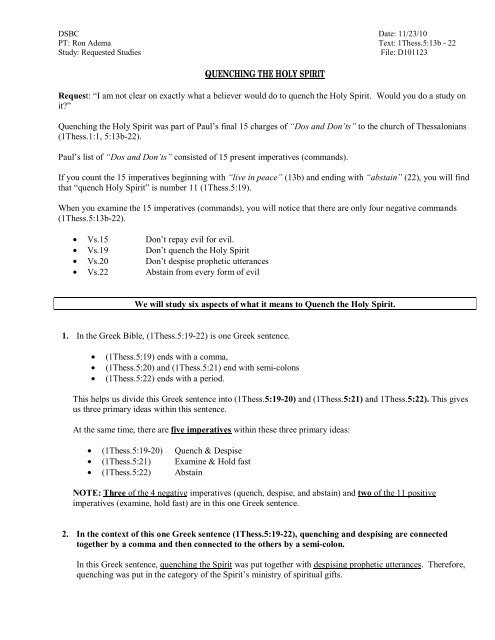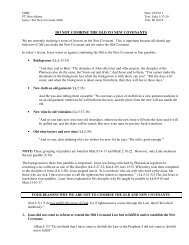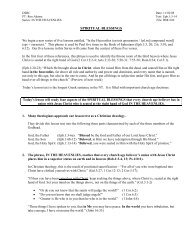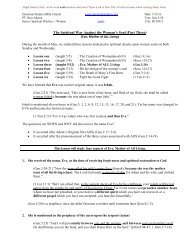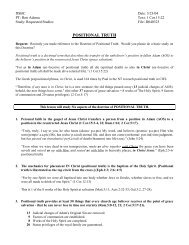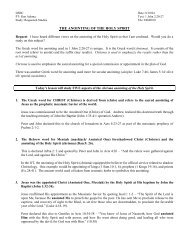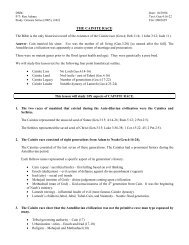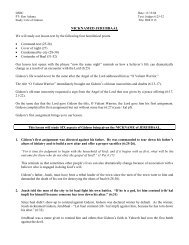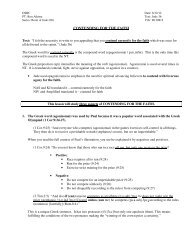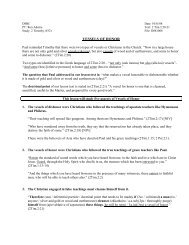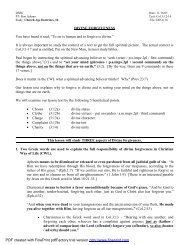QUENCHING THE HOLY SPIRIT - Doctrinal Studies Bible Church
QUENCHING THE HOLY SPIRIT - Doctrinal Studies Bible Church
QUENCHING THE HOLY SPIRIT - Doctrinal Studies Bible Church
Create successful ePaper yourself
Turn your PDF publications into a flip-book with our unique Google optimized e-Paper software.
DSBC Date: 11/23/10<br />
PT: Ron Adema Text: 1Thess.5:13b - 22<br />
Study: Requested <strong>Studies</strong><br />
File: D101123<br />
<strong>QUENCHING</strong> <strong>THE</strong> <strong>HOLY</strong> <strong>SPIRIT</strong><br />
Request: “I am not clear on exactly what a believer would do to quench the Holy Spirit. Would you do a study on<br />
it”<br />
Quenching the Holy Spirit was part of Paul’s final 15 charges of “Dos and Don’ts” to the church of Thessalonians<br />
(1Thess.1:1, 5:13b-22).<br />
Paul’s list of “Dos and Don’ts” consisted of 15 present imperatives (commands).<br />
If you count the 15 imperatives beginning with “live in peace” (13b) and ending with “abstain” (22), you will find<br />
that “quench Holy Spirit” is number 11 (1Thess.5:19).<br />
When you examine the 15 imperatives (commands), you will notice that there are only four negative commands<br />
(1Thess.5:13b-22).<br />
• Vs.15 Don’t repay evil for evil.<br />
• Vs.19 Don’t quench the Holy Spirit<br />
• Vs.20 Don’t despise prophetic utterances<br />
• Vs.22 Abstain from every form of evil<br />
We will study six aspects of what it means to Quench the Holy Spirit.<br />
1. In the Greek <strong>Bible</strong>, (1Thess.5:19-22) is one Greek sentence.<br />
• (1Thess.5:19) ends with a comma,<br />
• (1Thess.5:20) and (1Thess.5:21) end with semi-colons<br />
• (1Thess.5:22) ends with a period.<br />
This helps us divide this Greek sentence into (1Thess.5:19-20) and (1Thess.5:21) and 1Thess.5:22). This gives<br />
us three primary ideas within this sentence.<br />
At the same time, there are five imperatives within these three primary ideas:<br />
• (1Thess.5:19-20) Quench & Despise<br />
• (1Thess.5:21) Examine & Hold fast<br />
• (1Thess.5:22) Abstain<br />
NOTE: Three of the 4 negative imperatives (quench, despise, and abstain) and two of the 11 positive<br />
imperatives (examine, hold fast) are in this one Greek sentence.<br />
2. In the context of this one Greek sentence (1Thess.5:19-22), quenching and despising are connected<br />
together by a comma and then connected to the others by a semi-colon.<br />
In this Greek sentence, quenching the Spirit was put together with despising prophetic utterances. Therefore,<br />
quenching was put in the category of the Spirit’s ministry of spiritual gifts.
Many early churches had problems with the Spirit’s ministry of spiritual gifts and especially communication<br />
gifts (1 Cor.12-14; Eph.4:11).<br />
The importance of the indwelling ministry of the Holy Spirit within the church was established by present<br />
imperative (command).<br />
3. The Greek word for quench is sbennumi.<br />
• It means to put out a fire or extinguish (Acts 2:3-4).<br />
• It involves the ministry of the indwelling Spirit such as:<br />
o Walk in every area of our life, being led, fruit, walk in step (Gal.5:16, 18, 22-25)<br />
o Prayer (Rom.8:26-27,)<br />
o Another Comforter (John 14:16),<br />
o Teaches and recalls the Word of God (CBD) (John 14:26),<br />
o Conviction (John 16:8),<br />
o Guide into all truth (John 16:13; Heb.4:12),<br />
o Spiritually gifted ministry (1 Cor.12:7, 11).<br />
We will examine the translation of sbennumi (quench) in four Scriptures:<br />
(Matt.25:8; Mark 9:48; Eph.6:16; and Heb.11:34).<br />
4. Quenching The Holy Spirit is 1 of 8 offenses listed against the Spirit:<br />
• Resisting Acts 7:51<br />
• Lying Acts 5:3<br />
• Tempting Acts 5:9<br />
• Opposing Gal.5:17<br />
• Grieving Eph.4:30<br />
• Quenching 1 Thess.5:19<br />
• Insulting Heb.10:29<br />
• Blasphemy Matt.12:31-32).<br />
5. You might wonder why this one Greek sentence was broken up into three ideas.<br />
(1Thess.5:19-20) and (1Thess.5:21) and (1Thess.5:22) and five imperatives (3 negatives and 2 positives).<br />
• The 2 positive commands given in 1Thess.5:21 are directed to the specific context of 1Thess.5:19-22<br />
o (5 imperatives) as well as to the general context of 1Thess.5:13b-22 (15 present imperatives).<br />
• The 2 positive imperatives (Dos) are in contrast to the 3 negatives (Don’ts).<br />
o “But (de) [contrast] examine (dokimazo) everything carefully; hold fast (katecho) to that<br />
which is good;”<br />
What we learn from these 2 imperatives is the mechanics for obeying all the commands of the Word of God so<br />
as to not quench the Holy Spirit.<br />
6. We can expand this principle into the general context of the 15 present imperatives (1Thess.5:13b-22)<br />
• Live in peace with one another (1Thess.13b)
• Admonish the unruly<br />
• Encourage the fainthearted<br />
• Help the weak<br />
• Be patience with all men (1Thess.14)<br />
• See that no one repays another with evil for evil<br />
• But always seek after that which is good for one another and for all men (1Thess.15)<br />
• Rejoice always (1Thess.16)<br />
• Pray without ceasing (1Thess.17)<br />
• In everything give thanks; for this is God’s will for you in Christ Jesus (1Thess.18)<br />
• Do not quench the Spirit (1Thess.19)<br />
• Do not despise prophetic utterances (1Thess.20)<br />
• But examine everything carefully<br />
• Hold fast to that which is good (1Thess.21)<br />
• Abstain from every form of evil (1Thess.22)<br />
Simply put:<br />
How would you explain the difference between grieving and quenching the Holy Spirit<br />
• Grieving the Spirit involves willful sin and acting out of your Old Sin Nature’s lust trends.<br />
• Quenching the Spirit is not allowing the Indwelling Holy Spirit to do what He was sent to do in your<br />
Christian Life (like in point 3).


